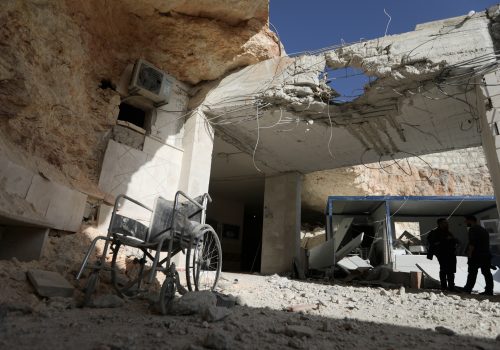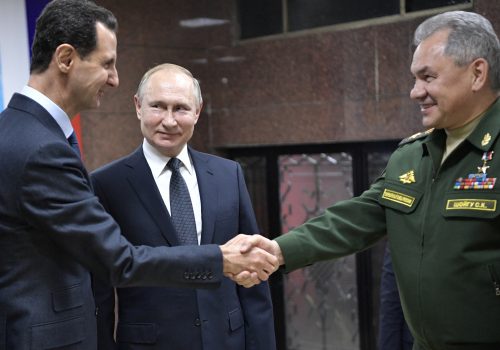Some advice to my Syrian and Syrian-American friends
Syrians and Syrian-Americans are voicing deep concerns that the new administration of President Joseph Biden will, with respect to Syria, reflect no more than the restoration of failed policies associated with the administration of President Barack Obama. I would be alarmed were this the case. I do not know that it is. But it would be natural for the Biden administration, beginning with the president himself, to hope fervently that Syria’s implosion can be left substantially to others to address; that public statements and humanitarian aid alone would suffice for American policy.
Indeed, those who would counsel an American policy approach to Syria focusing on that which is essential—political transition (albeit well short of violent regime change)—must take into consideration President Biden’s stated priorities. They reflect an impressively ambitious agenda.
He aims to restore the delivery capacity of American democracy, ensure domestic prosperity, resurrect civics, and protect the American people and American allies from authoritarian adversaries around the globe. Overcoming the pandemic, jump-starting the economy, renewing vital infrastructure, protecting voting rights, and restoring alliances and partnerships: these are the priorities. The Indo-Pacific, Europe, and Western Hemisphere top the list for foreign policy geographical focus.
Syrians, Syrian-Americans, and those who want effective American support for political transition in Syria should first internalize the priorities of the Biden administration as they craft Syria-related policy recommendations and offer advice to the administration and Congress. Recommendations and advice not tied to those priorities will not be well-received.
It may be obvious to those caught up in the Syrian struggle for a decade that adversaries of the United States have used the conflict there to damage the American brand both regionally and globally; they have made Syria an exporter of terrified humanity and an importer of Iranian and other forms of terrorism, all of which operate transnationally. But those who have focused quality time on Syria should not assume that what they see is seen by others.
Those who point with alarm to the Bashar al-Assad regime and its enablers continuing to use Syria as a stage to propagate American impotence in the region and internationally must take into account the possibility that President Biden just does not see it that way; that he may think Syria has no connection at all to his laudable and daunting policy priorities. He may think, as some of his senior officials probably do, that American national security interests are not engaged by Syria’s catastrophic self-destruction; that American allies and partners living closer to the toxic meltdown should fend for themselves.
None of this is meant to convey certainty about what the Biden administration will finally decide concerning Syria. Perhaps President Biden and key members of his team will not permit the mass killings of civilians in Syria to go undeterred and unpunished. Perhaps a well-organized administration with a qualified Syria point person will prove able to attend to the president’s top priorities while executing a strategy aimed at maximizing the prospects for political transition in a country where state terrorism breathes oxygen into the lungs of Islamist terrorism, both Iran and al-Qaeda-related. Perhaps the new administration will ultimately, without the benefit of an instructive foreign policy fiasco, perceive an important connection between what happens in Syria and achieving its foreign policy goals.
But the possibility of American abdication in Syria cannot be dismissed. Ironically it could be the well-intentioned product of a president trying to display the kind of disciplined focus justifiably seen by many as admirable.
There is indeed a danger that those at home and abroad who advocate normalization with the Assad regime and the unblocking of reconstruction aid for a kleptocracy may ultimately prevail. Some may think conceding defeat in Syria might be just the thing to persuade Tehran to take substantive steps toward the restoration of the nuclear deal. Others may counsel employing only humanitarian aid and statements condemning mass homicide—along with rhetorical demands for accountability—as sufficient to check the policy box on Syria.
Indeed, Syrians and Syrian-Americans increasingly express the fear that President Obama’s third term has already taken hold on Syria policy. I do not know. Surely there will be no public grandstanding directing a dictator to step aside or drawing erasable red lines. A decision to react only rhetorically to civilian slaughter in Syria might even prompt officials of this administration to avoid using the phrase “Never Again” on Holocaust Day.
Yet even if passivity turns out to be the policy of choice, the Assad regime and its enablers may ultimately bite the US, its allies, and its partners hard enough to mandate more from the West than band-aids and talk. In the meantime, however, those offering Syria-related advice to a president and an administration preferring to be focused elsewhere would do well to exercise modesty in their recommendations and restraint in their expectations.
If there are grand plans out there for American full-time heavy lifting in transforming Syria from a threat to the peace to a model of inclusive, legitimate governance, now is probably not the time to offer them. Surely, such proposals would be used by advocates of passivity and abdication to mock “outsiders” who “don’t get it.” If the administration decides it can safely fake it on Syria, it will learn soon enough what became clear in the Obama administration: inaction itself can be reckless, destabilizing, and dangerous; it can produce deadly unintended consequences just as readily as ill-considered action can.
President Biden knows this to be true. He experienced it as Obama’s vice president. Ideally, he would authorize a modestly resourced effort to act effectively in Syria while keeping his eyes on the prize: the establishment of democracy as the go-to system globally. Ideally, he would direct that Syria serve as a platform for the operational resurrection of key alliances and partnerships. Letting it remain a stage on which Iran, Russia, and Assad prance about in a drama featuring American impotence and irrelevance would not be consistent with what the new American president seeks to accomplish internationally. China, Russia, Iran, and others will draw conclusions from Syria about the condition of America’s spine regardless of whether Washington wants to engage. They have done so for a decade. Nothing will change. There is simply no escaping being the United States.
President Biden cannot do everything. Nor should he try. But what happens in Syria won’t stay there. It never has and never will. Still, advocates for an American policy in Syria focused on political transition must be sensitive, in their advocacy, to the policy priorities of an administration whose success would be vitally important to the US and the world. Connecting that advocacy to those priorities is essential. The connection is clearly there. Making it is the price of admission for serious consideration.
Ambassador Frederic C. Hof is Bard College’s Diplomat in Residence.
Image: A Syrian man inspects the damage in the aftermath of an airstrike that was allegedly carried out by Russian warplanes on a truck depot near Bab al-Hawa border crossing on the Syrian-Turkish border.


